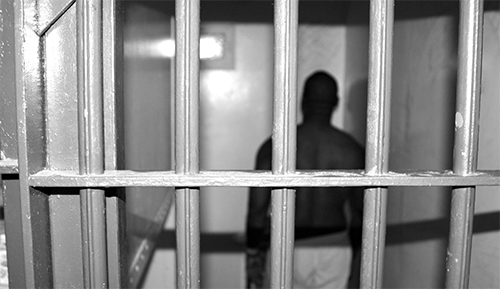
After he returned from Iraq both homeless and out of work, Stephan Papa spent one night in a drunken misadventure. Convicted of destruction of property and resisting arrest, Mr. Papa was sentenced to pay $2600 in fines and court fees.
If Mr. Papa had been able to pay the first $50 installment toward his debt on the spot, he would have been able to walk out of court. But he only had $25 on him. Mr. Papa told the judge he would get his first paycheck in a week. He pleaded not to be thrown in jail for falling a mere $25 short: "I tried really hard to get this job, and I'd really like to keep it," he said.
I think we can all pretty much agree that helping a vet find stable employment after service overseas is a right thing to do, something our laws and regulations should help to achieve, not disrupt. Well, here's what happened instead: Mr. Papa found a job, but because of a judge's decision to jail him for $25, he lost it.
Instead of letting him go to work, the judge ordered Mr. Papa to serve 22 days in jail for nonpayment of his fines and fees – and, in a wildly tone-deaf move, also ordered Papa to "maintain stable employment" as a condition of probation once he got out of jail. Not surprisingly, when Mr. Papa called his boss after his release, he found out his position had been filled by another person. Although he's now gotten another job, it pays less than his previous one, and he is struggling to pay the $2,000 in fines, fees, and restitution that he continues to owe the court.
Let's take stock of what this government action "achieved." One veteran mired in debt after being needlessly jailed for the better part of a month. Taxpayers out thousands of dollars for locking someone up for 22 days because he couldn't pay $50 on the spot. And a mass incarceration crisis made worse by illogical practices like this one.
Debtors' prisons are unconstitutional, according to a 1983 Supreme Court decision. And yet, as last week's NPR series "Guilty and Charged" makes clear, stories like Mr. Papa's are not isolated events. All across the country, we're seeing the rise of an "offender-funded" criminal justice system – a Dickensian push by courts to fund the criminal justice system on the backs of the people least able to afford it – and the accompanying explosion of modern-day debtors' prisons: the cruel, dysfunctional enforcement mechanism for collecting these fines and fees.
Courts across the country regularly charge criminal defendants for their public defenders, bill them for room and board during jail stays, and charge them for probation "services." Indeed, in 48 states, these fees have actually increased since 2010. Some of the worst practices come from states we normally think of as being progressive, such as Washington, which automatically charges 12 percent interest on unpaid fines and fees, even during the period of a person's incarceration.
As Papa's story makes clear, the judicial system is spending a lot of money jailing poor people for their lack of money, when it should be questioning whether incarceration is the right solution to recover excessive fines and fees imposed on people who are simply too poor to pay. Not only is this plan doomed to cost more than it collects, but it's just one more example of how our criminal justice system has gone out of control, needlessly throwing away lives and livelihoods and punishing the poor more harshly than the rich.
Even if judges and legislators didn't intend to create these injustices, they need to act now to end them.
Learn more about the debtors' prisons and other civil liberty issues: Sign up for breaking news alerts, follow us on Twitter, and like us on Facebook.

